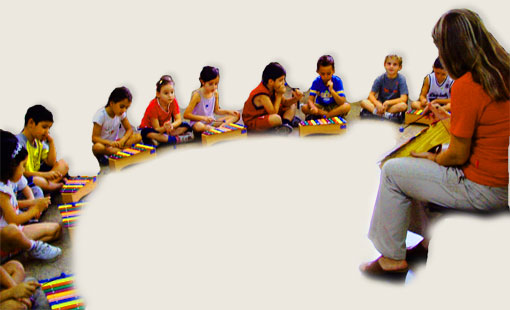Havrutav - English version > home page
English Menu |
Havrutav – an alternative approach to music education
Artistic music education in Israel can be roughly divided into two types:
The first type is musical education that aims at cultivating musicians. Teachers, themselves musicians, transmit professional credentials to the next generation, and success is measured by the number of concerts, competitions and festivals in which their student participates. At a later stage the goal is for her or him to become an active musician. The musical canon is by and large imported.
The second type is a musical education that aims to cultivate love of music and music appreciation. Here the aim is not to engage the student in musical activity, but to make him or her a good listener. Success is measured by the extent to which the student has become "musically educated". She or he will learn how to appreciate the great masters, attend concerts and enjoy music as a consumer. Here too, the cultural canon is based on mainly European and Western musical traditions.
When we attempt to measure the success of both these educational options, we are confronted with a few embarrassing facts:
Only 1% of the children learning to play an instrument will develop a professional interest in music. Most will give up the dream of becoming musicians, and some will become bitter and frustrated because of the false hopes invested in them. Even among students who study music appreciation the feeling prevails that this is but an attempt to preserve a culture to which they have no attachment. The small number of young people who visit concert halls is ample proof of this sentiment.
The Havrutav method places an emphasis on the social experience of artistic creation from the very beginning. This helps to attenuate the individualistic and career-oriented ethos that characterizes musical education of the first type.
At the same time, we do not relinquish the experience of performing music. We do not forgo the attempt to achieve professional excellence. Studying by the Havrutav method creates conditions in which love and enjoyment of artistic creativity can flourish independently: the very first steps in the world of musical-making are taken together, and the definition of success is both aesthetic and social. The aesthetic experience includes ethical aspects of consideration, listening, responsibility, and more.
Integrating the study of Hebrew poetry – another element of the method – endows our musical education with a further dimension. This aspect of the musical curriculum, enriches the artistic dimension by cultivating identification with Hebrew culture.
These essential elements provide the basis for professionalization, as well as engagement with materials originating outside the local culture. But by now the musician has become a different person: he or she will presumably derive pleasure from playing music even without the need for competitive achievement. And if a professional pursuit evolves, it will build upon an ethical basis of identity-formation, acquired through the educational process. This will allow the young musician to take off and reach even greater heights and depths of achievement.
